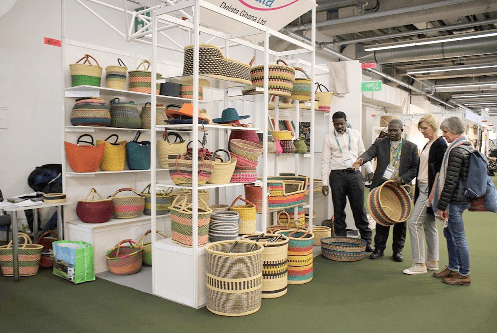
Local exporter loses export deal over COVID-19
A Local exporter of handwoven baskets, popularly referred to as “Bolga baskets”, Delata Ghana Limited, says it has lost a €100,000 deal to supply baskets to some selected countries in Europe, South America and Asia, as a result of the COVID-19 pandemic.
The company received orders ranging from 500 pieces to 10,000 pieces of baskets, beads and wooden products to France, Netherlands, Spain, Korea, Australia, Brazil, South Africa, Sweden and Finland.
This was during the Ambiente trade fair in Germany in February this year.
The Chief Executive Officer (CEO) of Delata Ghana, Mr Mawuli Akpenyo, said the orders were the biggest in the life of the company on the Ambiente platform in the last 12 years.Mr Akpenyo was the sole exhibitor from Ghana to have participated in the 2020 edition of the global consumer sourcing fair organised by Messe Frankfurt Exhibitions Limited, in Frankfurt, Germany
The fair attracted some 4,635 exhibitors from 93 countries and a total of 108,000 buyers (visitors) from nearly 160 countries.
He said he was hopeful to use the orders to scale up production capacity, to make it possible to meet delivery timelines of 10 to 12 weeks to the buyers in the selected countries.
Setback
However, he told Daily Graphic that the coronavirus pandemic had led to the cancellation of orders, while others had deferred payment terms from an initial one month after delivery to a three months period.
Delata Company, which also had orders to supply baskets to Home-Goods shop in the United States, had been working with some 500 women in the northern part of the country.
Due to the situation, Mr Akpenyo said the company might have to scale down the number of the weavers.
“With the order, our hope was to bring in a larger number of women weavers, train them quickly and also get materials for them so the production could start to meet the delivery timelines,” Mr Akpenyo stated.
Expressing worry at the turn of events, he said he hoped that the contracts would have increased the income base for women weavers.
“For us, we don’t want to be just creators of these products, but making the process an activity that can transform, connect and empower the women weavers who are a core of our activity,” he stressed.
Financial Support
Delata Company which, he said, had over the last two decades had difficulty raising funds to meet order delivery timelines, had managed to secure a loan of GH¢210,000 from a local bank to undertake the production and export of the orders.
“Accessing finance within our enterprise has been the most difficult thing to do since many lending institutions do not find the enterprise of handicraft export profitable to invest in,” Mr Akpenyo stressed.
The situation, he said, had seen many exporters folding up and diversifying into commerce and other activities, although as operators they could have collaborated to accelerate growth if financing was to be encouraged.
He also stressed the importance for producers who are still making some gains in the sector to look at product design, presentation, quality assurance and method of export which, he said, was key to the international market.
“I am certain that beyond the COVID-19, there will still be a market out there for handmade handicraft products, and since business is not static, but an ongoing process which requires entrepreneurs to constantly revise their strategy to meet the modern day demands, our expectation is to see how the government’s stimulus package being offered to SMEs will assist us get out of the woods,” Mr Akpenyo stressed.